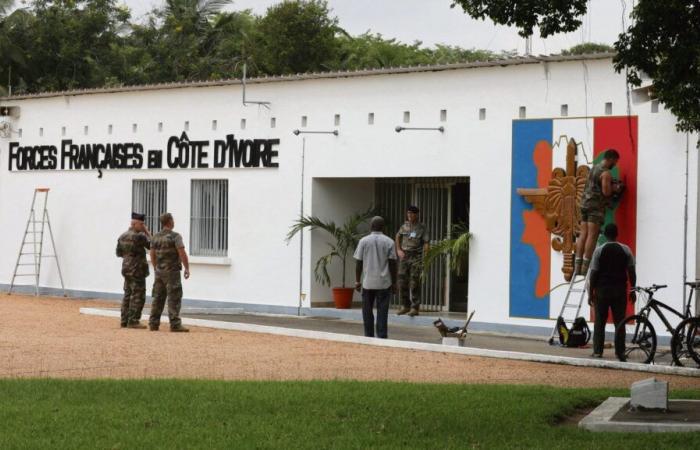When Jean-Noël Barrot flew from Ndjamena on November 28, the Minister of Foreign Affairs, returned to the Bayrou government, looked like the delighted one from the nursery. Satisfied to have mentioned “the most serious crisis of our time”that of neighboring Sudan. He had barely set foot on the plane when Chad announced, through his counterpart, Abderaman Koulamallah, the brutal termination of the military cooperation agreement which has linked the two countries since 1976, when nearly 1 000 French soldiers are still stationed in a strategic country for France: “It is time for Chad to assert its full sovereignty, and to redefine its strategic partnerships according to national priorities. »
The same day, it was the Senegalese president, Bassirou Diomaye Faye, who on France 2 estimated that “the sovereignty (of Senegal) does not accommodate the presence of military bases”. Comments reiterated on the occasion of the wishes of January 1, with “the end of all military presences of foreign countries in Senegal, from 2025”. In Dakar, around 350 French soldiers are still stationed in the heart of the city. A presence that has lasted for… almost a hundred years.
Finally, still during the New Year greetings, this time it was a faithful ally – even an accomplice – of Paris who announced the handover of the French base where 1,000 soldiers are stationed: “We have decided on the concerted and organized withdrawal of French forces in Ivory Coast”declared Head of State Alassane Ouattara, also forced to take into account this theme which has become major for African youth.
Double diplomatic setback
These new challenges follow those that are much more conflictual in the three countries that have experienced military coups since 2021: Mali, then Burkina Faso, finally Niger, where the last soldiers quickly packed up a year ago. For René Lake, political scientist and administrator of the SenePlus site, “the double diplomatic setback inflicted on France marks a critical stage in Franco-African relations”emphasizing “decisions which underline a growing rejection of the neocolonial order by African nations”.
What happened for Chad, Senegal and now Ivory Coast to denounce this military presence a few days apart, in almost identical terms? Despite similar speeches and causes, the situations are very different. “In countries like Senegal and Chad, this demand is expressed in varied ways, but it converges around common principles: economic autonomy, control of national resources and respect for local political choices”deciphers René Lake.
However, these decisions are specific to each country. In Senegal, the question of French military bases had already been raised by President Abdoulaye Wade in the 2000s. It had been at the heart of the concerns of the Senegalese during the presidential election last March, then the legislative elections in November, won by Pastef (African Patriots of Senegal for work, ethics and fraternity).
“Snub for Macron”
But it is, of course, a “snub for Macron, which is part of a process that began at the end of the Cold War, in 1989”analyzes Félix Atchadé, doctor and head of the PCF Africa collective. According to him, “Paris, despite the changes in the world order, still managed to maintain its influence over its former colonies. Today, this order is faltering. »
In June 2024, aware of these questions, Emmanuel Macron announced a reduction in workforce in all countries, Senegal and Ivory Coast included. He had pompously appointed Jean-Marie Bockel “personal envoy to Africa”, with the responsibility of submitting a report on the subject after discussions with the heads of state concerned.
However, the leak of several elements of this report, submitted to Emmanuel Macron on November 25, has, it seems, annoyed Bassirou Diomaye Faye and his compatriots. Because, if Jean-Marie Bockel evoked a dialogue conducted “in a positive state of mind”the same nevertheless recommended keeping around a hundred soldiers in Dakar… unilaterally.
In Chad, despite the vehemence of the first reaction, the issues are in reality diplomatic. To put it in blunt terms, “Barrot completely screwed up”blames Guy Labertit, former national delegate for Africa of the PS and author ofAnticolonially yours (Karthala, 2024). Especially since in Chad – as elsewhere – Emmanuel Macron “is very attacked for having dubbed Mahamat Déby”he recalls.
Allusion to the transfer of power locked by the heir of Idriss Déby, the father, killed in 2021 after thirty-one years of autocratic power supported by France. “In Chad, with Barrot, it is Françafrique which continues, in the stupidest way possible”deplores Guy Labertit.
During his lightning visit, Jean-Noël Barrot demanded Chad's neutrality in the war in neighboring Sudan, where Mahamat Déby is a supporter of Hemetti's rebels. This breakup “only concerns the military cooperation agreement in its current configuration”specified Mahamat Déby, while his Prime Minister, Allamaye Halina, indicated that the decision “is part of a desire to strengthen national sovereignty and reassess international agreements”. This means “that they want to discuss again”deciphers Guy Labertit.
The brutal ruptures with the three countries led by the military and united in the Alliance of Sahel States (AES), Mali, Burkina Faso and Niger, where France no longer even has an ambassador, seem to have served as a lesson. “Finally, I am happy to see what is happening, because we have always wanted the end of Françafrique”summarizes Guy Labertit. The problem is that this comes at the expense of what a real foreign policy could be, as René Lake analyzes: “The fundamental question is: will France continue to cling to a reactive posture, dictated by maintaining its strategic and economic interests, or will it adopt a proactive and transformative approach, focused on recognition African aspirations? » It's about time.
To be the newspaper of peace, our daily challenge
Since Jaurès, the defense of peace has been in our DNA.
- Which still informs today about the actions of the pacifists for disarmament?
- How many media point out that decolonization struggles still exist, and that they must be supported?
- How much value do international solidarityand unambiguously commit to the side of the exiles?
Our values have no borders.
Help us support the right to self-determination and the option of peace.
I want to know more!






